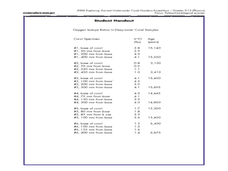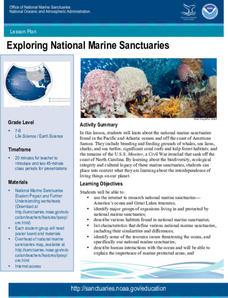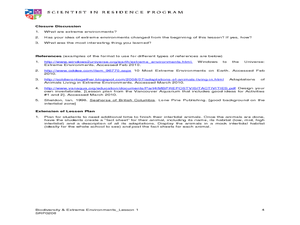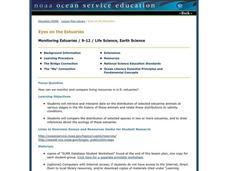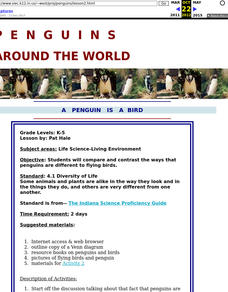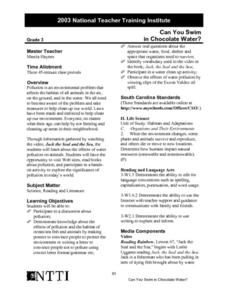Curated OER
Sharks: Scavenging Stomachs
Students examine the role played by sharks in the marine food chain. They conduct a scavenger hunt collecting items that have actually been removed from the stomachs of sharks, and create a display that includes the items and newspaper...
Curated OER
Cutt-Off Genes
Students explore how gene sequence analysis can be used to examine phylogenetic similarities of different organisms. Students work in groups to simulate a gel electrophoresis separation of fragments using poster board to create their gel.
Curated OER
Deep Gardens
Students compare and contrast deep-sea coral reefs with shallow-water coral reefs. In this underwater ecology lesson, students describe three types of coral and explain why scientists are concerned about the future of deep-sea coral.
Curated OER
What's Down There
Students write an essay about the coral reefs. In this oceanography lesson, students investigate the reef of Bonaire and compare it to reefs that are not thriving. Students then explore the differences that contribute to the overall...
Curated OER
Frozen Seas
Students research animal life in the frozen seas. In this researched based lesson, students use the Internet to create a poster about an animal that lives in an Arctic or Antarctic environment. Students will focus on the behavioral and...
Curated OER
How can deep-water corals be used to determine long-term patterns of climate change?
Students explore the concept of paleoclimatological proxies. In this paleoclimatological proxies lesson, students explain isotope ratios in deep water coral samples. Students write a paragraph about global climate change as it effects...
Curated OER
Yummy Plant Parts
Students examine plant parts. In this botany instructional activity, students examine various edible plants and how their adaptations help them to grow. They observe stems, leaves, roots and flowers of plants and discuss the relationship...
Curated OER
Going for the Green
Learners use satellite imagery to obtain information on chlorophyll concentration at selected locations in the Earth's oceans.Students explain the relationship between chlorophyll concentration and primary production.Studen
Curated OER
Who's Your Neighbor?
Pupils recognize and identify some of the fauna groups found in deep-sea coral reef communities. They describe common feeding strategies used by benthic animals in deep-sea coral reef communities.Students be able
Curated OER
Exploring National Marine Sanctuaries
Middle schoolers conduct Internet research of the living organisms in national marine sanctuaries, and the resources protected in the sanctuaries. Students gather information about each of the sanctuaries and make an oral presentation...
Curated OER
Salt Marsh Plants and Animals
In this salt march plant and animals instructional activity, students read descriptions of animals, then match each to its picture. Students then read about tidal animals and choose which animals in picture are most likely to be in a...
Curated OER
The Environments of Big Sur:Which Do We Protect?
High schoolers examine the California environments. In this environmental lesson, students examine the various ecosystems of California, creating a presentation on how these environments impact Big Sur. They write a paper defending their...
Curated OER
Save A Reef!
Students identify the major threats to coral reefs and the ways that they benefit from humans. In this coral reef conservation lesson students create a public education program on coral reefs.
Curated OER
It's not just pretty - it's a survival method!
First graders write explanations for why certain animals can only live in certain environments. In this animal survival lesson plan, 1st graders take pictures of animals and place them into the right environment after a lesson plan on...
Curated OER
Extreme Environments
Students examine extreme environments and the characteristics that make them. In this adaptation lesson students see how animals have adapted to these environments.
Curated OER
Prince William's Oily Mess: A Tale of Recovery
In this environment instructional activity, students explore the effects of the Exxon Valdez oil spill. Students read and study text and photographs about the 1989 spill. Students answer 6 essay questions.
Curated OER
All Hands on Deck: A Harbor Education Program
Students build a model of an estuary. In this wetland lesson, students build a model estuary with a paint tray and modeling clay. They use the model to illustrate the impact of non-point pollution on the watershed.
Curated OER
Is It Getting Hot In Here?
Students describe several factors and ways climate change could effect communities. In this climate change lesson plan students research climate change and complete a worksheet.
Curated OER
Eyes on the Estuaries
Young scholars study estuaries and compare several ones in the U.S. In this estuary lesson plan students interpret data and compare the distribution of different species.
Curated OER
What Do You Know About Horseshoe Crabs?
High schoolers create a learning tool based on information given on the assigned website. In this ocean life lesson, students read about the horseshoe crab and develop a worksheet, scavenger hunt, board game or any tool to aid learning....
Curated OER
The Water Cycle
When homeschooling parents and children tackle the water cycle, the results can be a fascinating exploration of our environment.
Curated OER
Breaking Away (Or Not...)
Students compare and contrast common reproductive strategies used by benthic invertebrates. They describe the most common reproductive strategies among benthic invertebrates on a seamount, and explain why these strategi
Curated OER
A Penguin is a Bird
Students compare and contrast the ways that penguins are different to flying birds.
Curated OER
Can You Swim in Chocolate Water?
Third graders discss water pollution and its affects on animals. They watch a demonstration using a plastic fish in a fish bowl in which various types of water pollution are illustrated.
Other popular searches
- Deep Ocean Habitats
- Deep Ocean Habitats
- Ocean Habitats Year 2
- Science Ocean Habitats
- Ocean Habitats Math
- Ocean Habitats Producers
- Ocean Habitats Inquiry Based
- Ocean Habitats Inquiry
- Ocean Habitats Language Arts
- Powerpoint Ocean Habitats







